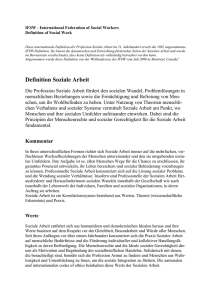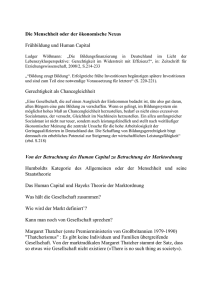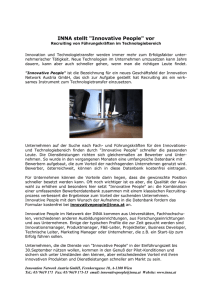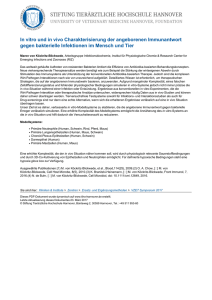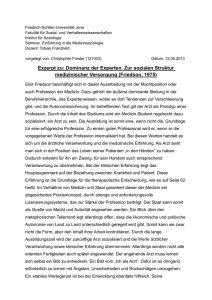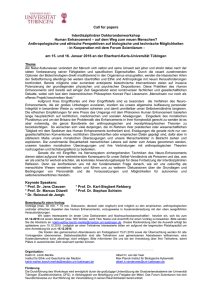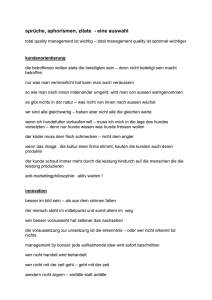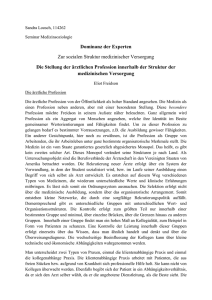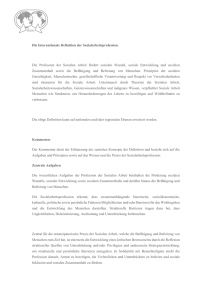Neue Definition von Sozialarbeit
Werbung
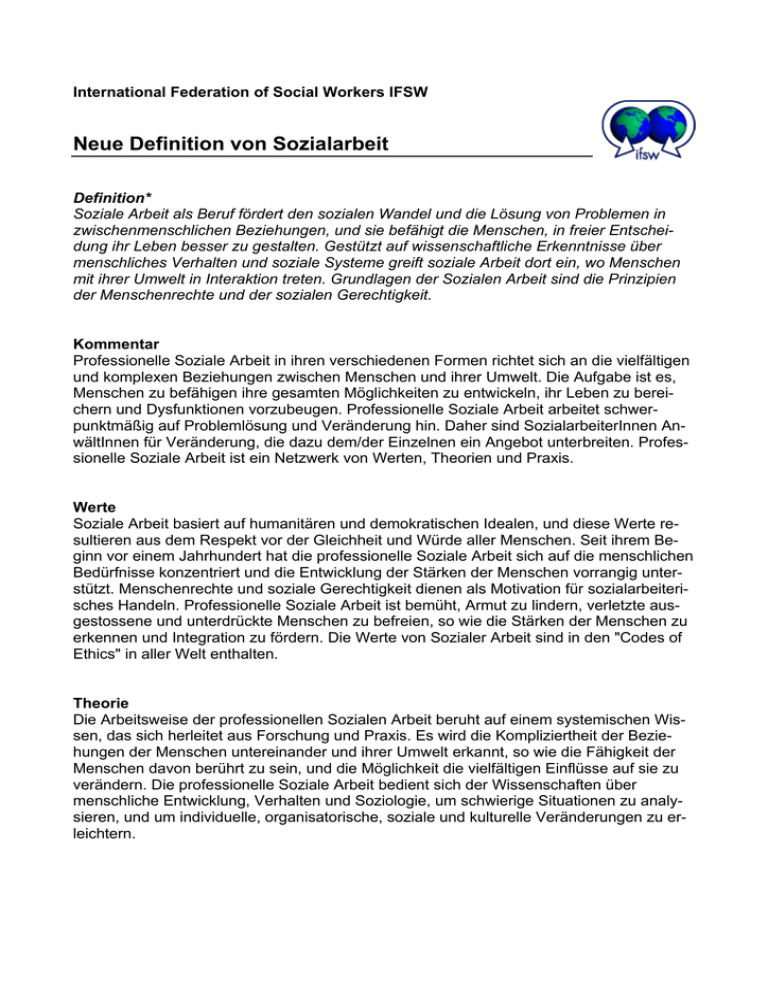
International Federation of Social Workers IFSW Neue Definition von Sozialarbeit Definition* Soziale Arbeit als Beruf fördert den sozialen Wandel und die Lösung von Problemen in zwischenmenschlichen Beziehungen, und sie befähigt die Menschen, in freier Entscheidung ihr Leben besser zu gestalten. Gestützt auf wissenschaftliche Erkenntnisse über menschliches Verhalten und soziale Systeme greift soziale Arbeit dort ein, wo Menschen mit ihrer Umwelt in Interaktion treten. Grundlagen der Sozialen Arbeit sind die Prinzipien der Menschenrechte und der sozialen Gerechtigkeit. Kommentar Professionelle Soziale Arbeit in ihren verschiedenen Formen richtet sich an die vielfältigen und komplexen Beziehungen zwischen Menschen und ihrer Umwelt. Die Aufgabe ist es, Menschen zu befähigen ihre gesamten Möglichkeiten zu entwickeln, ihr Leben zu bereichern und Dysfunktionen vorzubeugen. Professionelle Soziale Arbeit arbeitet schwerpunktmäßig auf Problemlösung und Veränderung hin. Daher sind SozialarbeiterInnen AnwältInnen für Veränderung, die dazu dem/der Einzelnen ein Angebot unterbreiten. Professionelle Soziale Arbeit ist ein Netzwerk von Werten, Theorien und Praxis. Werte Soziale Arbeit basiert auf humanitären und demokratischen Idealen, und diese Werte resultieren aus dem Respekt vor der Gleichheit und Würde aller Menschen. Seit ihrem Beginn vor einem Jahrhundert hat die professionelle Soziale Arbeit sich auf die menschlichen Bedürfnisse konzentriert und die Entwicklung der Stärken der Menschen vorrangig unterstützt. Menschenrechte und soziale Gerechtigkeit dienen als Motivation für sozialarbeiterisches Handeln. Professionelle Soziale Arbeit ist bemüht, Armut zu lindern, verletzte ausgestossene und unterdrückte Menschen zu befreien, so wie die Stärken der Menschen zu erkennen und Integration zu fördern. Die Werte von Sozialer Arbeit sind in den "Codes of Ethics" in aller Welt enthalten. Theorie Die Arbeitsweise der professionellen Sozialen Arbeit beruht auf einem systemischen Wissen, das sich herleitet aus Forschung und Praxis. Es wird die Kompliziertheit der Beziehungen der Menschen untereinander und ihrer Umwelt erkannt, so wie die Fähigkeit der Menschen davon berührt zu sein, und die Möglichkeit die vielfältigen Einflüsse auf sie zu verändern. Die professionelle Soziale Arbeit bedient sich der Wissenschaften über menschliche Entwicklung, Verhalten und Soziologie, um schwierige Situationen zu analysieren, und um individuelle, organisatorische, soziale und kulturelle Veränderungen zu erleichtern. 2 Praxis Professionelle Soziale Arbeit benennt die Grenzen, Ungleichheit und Ungerechtigkeit, die in der Gesellschaft existieren. Sie antwortet auf Krisen und Gefahren ebenso, wie auf alltäglich auftretende persönliche und soziale Probleme. Professionelle Soziale Arbeit verfügt über eine Vielfalt von Methoden und Techniken so wie Handlungsmöglichkeiten, die sich sowohl auf den einzelnen Menschen wie auf die Umwelt konzentrieren. Die Intervention von professioneller Sozialer Arbeit reicht von rein personenbezogenen psychosozialen Prozessen, bis zur Beteiligung an sozialer Gesetzgebung, Planung und Entwicklung. Dies bezieht mit ein, Beratung, klinische Sozialarbeit, Gruppenarbeit, sozialpädagogische Arbeit, Familienberatung und -therapie. Ferner sollen Menschen unterstützt werden, Soziale Dienste in Anspruch zu nehmen. Auch Verwaltungstätigkeiten, so wie soziale Aktionen bedeuten Einmischung, um soziale Gesetzgebung und wirtschaftliche Entwicklung eng miteinander zu verknüpfen. Der Schwerpunkt von professioneller Sozialer Arbeit wird von Land zu Land, von Zeit zu Zeit variieren, dies hängt mit den kulturellen, historischen und sozialwirtschaftlichen Bedingungen zusammen. * Diese internationale Definition von professioneller Sozialer Arbeit ersetzt die IFSW Definition von 1982. Die professionelle Soziale Arbeit des 21. Jahrhunderts wird verstanden als dynamisch und sich weiterentwickelnd, von daher sollte keine Definition als endgültig angesehen werden. Übersetzung des englischen Originaltextes (IFSW Delegates Meeting Montreal 2000) durch Barbara Molderings, DBSH E-mail: [email protected] 3 International Federation of Social Workers Definition of Social Work DEFINITION* The social work profession promotes social change, problem solving in human relationships and the empowerment and liberation of people to enhance well-being. Utilising theories of human behaviour and social systems, social work intervenes at the points where people interact with their environments. Principles of human rights and social justice are fundamental to social work. COMMENTARY Social work in its various forms addresses the multiple, complex transactions between people and their environments. Its mission is to enable all people to develop their full potential, enrich their lives, and prevent dysfunction. Professional social work is focused on problem solving and change. As such, social workers are change agents in society and in the lives of the individuals, families and communities they serve. Social work is an interrelated system of values, theory and practice. Values Social work grew out of humanitarian and democratic ideals, and its values are based on respect for the equality, worth, and dignity of all people. Since its beginnings over a century ago, social work practice has focused on meeting human needs and developing human potential. Human rights and social justice serve as the motivation and justification for social work action. In solidarity with those who are dis-advantaged, the profession strives to alleviate poverty and to liberate vulnerable and oppressed people in order to promote social inclusion. Social work values are embodied in the profession’s national and international codes of ethics. Theory Social work bases its methodology on a systematic body of evidence-based knowledge derived from research and practice evaluation, including local and indigenous knowledge specific to its context. It recognises the complexity of interactions between human beings and their environment, and the capacity of people both to be affected by and to alter the multiple influences upon them including bio-psychosocial factors. The social work profession draws on theories of human development and behaviour and social systems to analyse complex situations and to facilitate individual, organisational, social and cultural changes. Practice Social work addresses the barriers, inequities and injustices that exist in society. It responds to crises and emergencies as well as to everyday personal and social problems. Social work utilises a variety of skills, techniques, and activities consistent with its holistic focus on persons and their environments. Social work interventions range from primarily person-focused psychosocial processes to involvement in social policy, planning and development. These include counselling, clinical social work, group work, social pedagogical work, and family treatment and therapy as well as efforts to help people obtain services and resources in the community. Interventions also include agency administration, community organisation and engaging in social and political action to impact social policy and economic development. The holistic focus of social work is universal, but 4 the priorities of social work practice will vary from country to country and from time to time depending on cultural, historical, and socio-economic conditions. * This international definition of the social work profession replaces the IFSW definition adopted in 1982. It is understood that social work in the 21st century is dynamic and evolving, and therefore no definition should be regarded as exhaustive.
